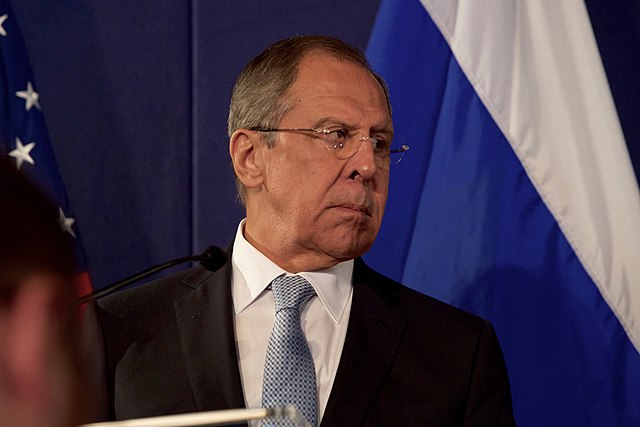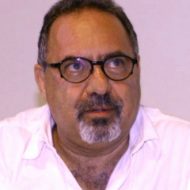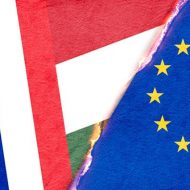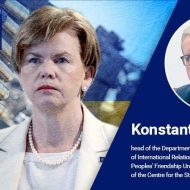My article last week “The UN must disappear” sparked an itch among some readers who wrote to me to express shock, let me know their opinions, express criticism and ask me if this was possible and how it should be done.
I remembered that a few months ago, in a meeting, a veteran retired Venezuelan diplomat, appealing to her many years of service and experience, reacted with a similar approach to my thoughts, called me to sanity and to understand that “things did not work that way.” This diplomat, who generally has a quite radical discourse, surrendered to tradition and to a practice that is now obsolete, especially because today, the UN, is incapable of solving the great problems of humanity.
In this framework, I would like – making my own interpretation – to present an article written by the Minister of Foreign Affairs of Russia, Sergei Lavrov, on October 10, 2023, published on the official website of that ministry. The text is quite extensive. I am going to try to summarize it, incorporating what in my opinion are the most salient aspects. Any errors or failures are my sole responsibility.
According to the Russian Chancellor, the planet is experiencing “fundamental and tectonic” changes that are giving rise to a new, more just multipolar world, thus reflecting the cultural and civilizational diversity of the Earth. Thus, the global majority (85% of the planet) advocates for a more equitable distribution of goods, for respect for civilizational diversity and for the democratization of international life.
This is the context in which Foreign Minister Lavrov explains the West’s rejection of the founding principles of the UN, for which he makes a historical analysis since the end of the Cold War, exposing the agreements made to prevent the expansion of NATO. In 2021-2022, Russia developed a proposal that was delivered to the West to establish mutual security guarantees, but they were silenced and rejected. With the militarization of Ukraine, NATO sought to extend its area of influence to the east, threatening Russia. It even took on the task of creating aggressive alliances in the Asia-Pacific by urging and provoking China, Russia and the Association of Southeast Asian Nations (ASEAN).
Extending the Monroe Doctrine worldwide
It seems that United States’ policy is aimed at extending the Monroe Doctrine to the entire world, thus trying to determine what the foreign policy of countries should be. The violation of the UN Charter is becoming a constant. They want to show the expansion of NATO as something beneficial and the extension of the BRICS as harmful. The United States intends to establish itself as the arbiter of the world. The fundamental principle of the UN Charter that says that the organization “is founded on the basis of the sovereign equality of all” is omitted. Likewise, the principle of non-interference in the internal affairs of other countries is being permanently undermined.
Since the disintegration of the USSR, the United States wanted to subordinate Ukraine. There is enough evidence of this. Washington’s direct interference in the overthrow of President Yanukovych is open, public and known. From that moment on, the country began to experience a spiral of repression, persecution and murder of those who did not accept and rejected the 2014 coup d’état. Likewise, racist measures of all kinds began to be applied and all forms of violence were violated. international laws.
In this context, the negotiation that concluded with the Minsk Agreements was carried out. Today it is known that they were only a great deception by Germany and France who only sought to buy time to oxygenate and strengthen Ukraine in order to prepare it for their macabre objectives.
Russia, which since 1997 had made all kinds of efforts to reach an agreement that accepted the indivisibility of security, began to perceive, especially since 2015, that a government practice of a supremacist and neo-Nazi nature was deepening in Ukraine.
In this context, the West has expressed fear of debating these issues. They have assumed a position regarding Ukraine but avoid talking about Mayotte and Comoros (France) as well as Chagos and Malvinas (United Kingdom). I would add that they also refuse to debate the colonial cases of Puerto Rico, the Sahrawi Arab Democratic Republic and Palestine.
Chancellor Lavrov believes that the liberal Western world model is intrinsic to a discourse of double standards in international politics. When the concept of free self-determination contradicts Western geopolitical interests, they condemn it and punish countries with sanctions. But if they are “interested” in self-determination, they support it, as in the case of Kosovo, which was taken from Serbia by NATO decision without holding a self-determination referendum for the people to give their opinion, as if it were done in Donbass and Crimea. Now, Brussels intends to impose its “mediation” between Azerbaijan and Armenia, only to try to destabilize the region, also located on Russia’s borders.
UN General Secretariat acting outside neutrality
Moving on to another topic, but continuing the analysis, Lavrov says that the United States seeks to prevent the democratization of international relations by imposing its criteria and violating the law and procedures. The UN General Secretariat itself acts outside the neutrality to which it is obliged.
In this context, he mentions Antonio Guterres’ speech on March 29 when he said that “…autocratic administration does not guarantee stability, but rather represents a catalyst for chaos and conflict,” while “strong democratic societies are capable of self-determination, amend and self-improve, being able to stimulate changes, even radical ones, without bloodshed or violence.” Lavrov says that without meaning to, Guterres “remembers one of the ‘changes’ generated by the aggressive adventures of the ‘strong democracies’ in Yugoslavia, Afghanistan, Iraq, Libya, Syria and many other countries.”
He then points out that in the same speech the Secretary General said that: “They [democracies] are centers of extensive cooperation that has its roots in the principles of equality, participation and solidarity.” The curious thing is that this rhetoric fully agrees with certain arguments of the United States government. It is also a proselytizing speech that comes “in direct contradiction with point 4 of Art. 1 of the Charter of the United Nations where the need for the UN ‘to serve as a center’ is stated. that harmonizes the efforts of nations to achieve these common purposes.”
Russian Foreign Minister: Western powers “abused” right to veto
In this framework, the Russian Foreign Minister believes that it is necessary to review the existing relations between the Security Council (SC) and the UN General Assembly (GA). He states that there has been an “abuse of the right to veto” by the Western powers. He explains that the United States even forced a debate on the matter in the General Assembly. However, he says that there are many SC resolutions approved many years ago without the veto having been applied, and they have not been complied with. Lavrov wonders why the GA does not analyze the causes of this situation, in particular those related to Palestine, Western Asia and North Africa.
On the other hand, he suggests that the problem of sanctions must be addressed because the United States and its allies have established additional unilateral sanctions that are illegal as they are decided outside the Security Council. Thus, it also happens that the SC has decided temporary sanctions that have been extinguished, however, as in the case of Iran, they continue to be applied. In practice, the West decides its own rules.
Lavrov’s proposals
The Russian Foreign Minister believes that it is necessary to make effective the spirit of multipolarity “explicit in the UN charter”, considering that the majority of the planet is in favor of “strengthening its sovereignty, defending its national interests, its traditions, its culture and its way of living”. According to him, this is present in the recent BRICS Summits, the G-20 and the East Asia Summit, which is why it is essential to reform the global management mechanisms as soon as possible.
Here I disagree with Foreign Minister Lavrov because I believe that this is impossible, given that the United States will veto any reform of the UN. It seems to me that the path (although perhaps long) should be to begin to build a parallel organization that from my point of view is germinating from the BRICS.
To finalize his reform proposal, Lavrov calls on:
- Recognize the real economic and financial weight of the countries of the Global South.
- Unblock the functioning of the WTO dispute settlement bodies.
- Expand the members with veto power in the SC.
- Address fairer methods in the “formation of the UN Secretariat.”
- Review the responsibilities of host countries at UN headquarters.
Of course, all this is possible if the United States agrees. It seems difficult, if not impossible, for them to accept that because this would curtail their institutional and legal hegemony over the world.
Finally, the article states that the application of these proposals would allow progress in the solidification of the supremacy of international law. Taking advantage of the potential of the Global South and its associations, first of all from BRICS, but also from other bodies such as the Shanghai Cooperation Organization (SCO), CELAC, the Arab League, ASEAN, the Collective Security Treaty Organization (CSTO). ), the Eurasian Economic Union (EAEU), the Commonwealth of Independent States (CIS) and the Belt and Road Initiative, among others, the potential of these groupings could be fully exploited. Some of them are helping to build a great Euro-Asian association, which – from my point of view – is the space where the new world will be born and the axis on which the new world will revolve.
Putin’s six principles
All these dynamics are trying to be counteracted by the United States and the West in general since their objective is to sustain their domination, maintaining a fragmented world. In this regard, the President of Russia, Vladimir Putin – with the aim of strengthening International Law based on the UN Charter – formulated six principles for the formation of authentic multipolarity. They are: openness and relationships without barriers that hinder communication in the world, respect for diversity as the foundation of joint development, maximum representation in global management structures, universal security based on the balance of interests of all, fair access to the goods of development, parity for all and renunciation of the dictatorship “of the rich or the strong.”
Foreign Minister Lavrov concludes by stating that humanity must overcome unipolarity and that there is a collective responsibility to achieve that goal, ensuring that “Russia, together with the countries that share its position, is willing to fully contribute to its implementation.”









Leave a Reply